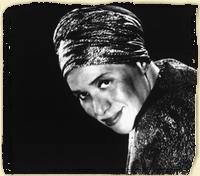
Dorothy Donegan, a jazz pianist

About Dorothy
Dorothy Donegan: Age 76 b. 6 April 1924, Chicago, Illinois, d. May 19, 1998.
Dorothy Donegan, a jazz pianist who brashly mixed swing, boogie-woogie, vaudeville, pop, ragtime and Bach -- sometimes within a span of 10 minutes -- and who was known for an outrageous sense of humor, She was known for her flamboyant performing and dextrous mixtures of musical styles. Fans loved her habit of making exaggerated hand motions while playing.
Born in Chicago, Donegan studied music at the Chicago Conservatory, Chicago Music College and University Southern California.
Encouraged by her mother to learn music, Donegan began studying classical piano but soon turned to jazz. A meeting with Art Tatum in the early '40s led to her becoming his protege. The following year she made her first record date and became a popular figure at Chicago clubs, playing a mixture of jazz, boogie woogie and cocktail music. She also made an appearance in the film SENSATIONS OF 1945 (1944).
Having started her jazz career as a single, she formed a trio in 1945 and continued to work in that format. Later in her career she was inclined to work as a soloist again, after being unable to appoint suitable drummers. In subsequent interviews she indicated a clear desire to return to playing classical music, a form which she used for her daily practice. A powerful performer with dazzling technique, she plays with enormous swing and has a solid following. The audience at a 1980 appearance in New York's Sheraton Centre Hotel broke previous attendance records.
While she was know for her jazz skills, Donegan also excelled at ragtime, boogie-woogie, gospel, blues, and classical music, and sometimes blended touches of various styles in the same song. Fans were treated to her visual antics at her live performances, including playing complicated pieces with only her left hand.
Among her albums were "I Just Want to Sing", "Dorothy Romps --A Piano Retrospective," and "Live at the 1990 Floating Jazz Festival."
Donegan received an American Jazz Masters fellowship from the National Endowment for the Arts in 1992.
See Article about her at:
http://elvispelvis.com/ddonegan.htmMs. Donegan was better known as a performer than as a recording artist, and her flamboyance helped her find work in a field that was largely hostile to women. To a certain extent, it was also her downfall; her concerts were often criticized for having an excess of personality. She would act out songs, mocking their words; do devastating parodies of pianists and singers, especially if they were in the audience, or get up and shake her hips while keeping up a left-handed riff.
She could push humor into brazenness and kept up a supply of off-color jokes. She told writers without hesitation that sexism caused her obscurity -- that, and her insistence on being paid at the same scale as her male colleagues.
Born in Chicago, Ms. Donegan was encouraged from an early age by her mother to become a professional musician. She was a church organist as a girl, and at 14 she was playing for a dollar a night at the city's South Side bars. She was one of many notable jazz musicians inestimably helped by the tutelage of Walter Dyett, a music teacher at DuSable High School, whose other students included Dinah Washington, Johnny Griffin, Gene Ammons and Von Freeman.
She played blues and boogie-woogie piano, even recording for the Bluebird label in 1942, but she aspired to be a classical concert pianist. She studied at the Chicago Conservatory and at the Chicago Musical College. In 1943, when she was 18, she gave a concert at Orchestra Hall in Chicago, the first black performer to do so. Time magazine covered the concert, and word about a pianist with a wide repertory and blizzard-fast fingers reached the jazz piano virtuoso Art Tatum, who came to her house to hear her play. Tatum showed her some of his technique and remained the strongest influence on her playing.
Hollywood soon came calling. Persuaded by her agent to turn down a five-year contract from MGM, she accepted a $3,000-a-week contract from United Artists for one picture, "Sensations of 1945." She appears in a duet scene with another pianist, Gene Rodgers, and the band behind them was Cab Calloway's. That was the end of her film career.
In the late 1950s she began a series of engagements at the Embers in Manhattan and the London House in Chicago. It was during this period that she developed her flamboyant performance style.
By the 1970s she was more comfortable, making a living playing in festivals in America and Europe and attracting a fierce coterie of fans in New York. A resident of Los Angeles since the 1950s, she would return occasionally to the East Coast for nightclub performances or a jazz-festival or concert-hall event. After a Town Hall performance in 1971, John Wilson wrote in The New York Times that Ms. Donegan "showed a technical virtuosity that could be compared only to that of Art Tatum and a swinging drive that might be equaled by Mary Lou Williams."